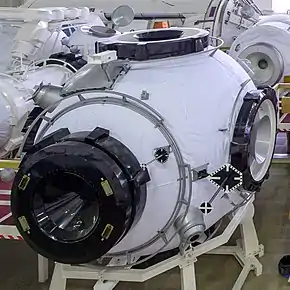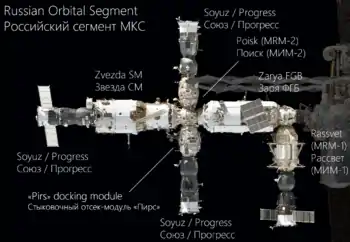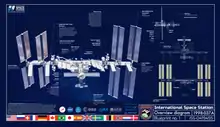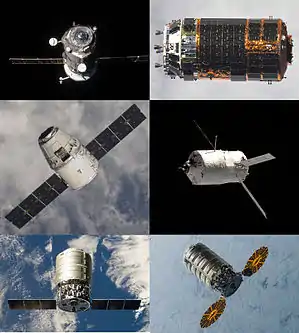Prichal (ISS module)
Nodal module Prichal also known as Uzlovoy Module or UM (Russian: Узловой Модуль "Причал", Nodal Module Berth)[1] is a Russian spacecraft which will form part of the International Space Station (ISS). It was approved in 2011 and is scheduled for launch in the third quarter of 2021, with operations beginning in 2022.[2][3][4][5] Originally, the node module was intended to serve as the only permanent element of the future Orbital Piloted Assembly and Experiment Complex (OPSEK), but those plans were scrapped in 2017.[2][6]

Design
The nodal module has a ball-shaped design with six hybrid docking ports. One port is active to allow docking with the space station, while the remaining five ports are passive, enabling other spacecraft to dock with the module.[2] Such a design is significantly different from the one of the docking modules Pirs and Poisk that have only one docking port for spacecraft each. Additionally, the port opposite to the active one would support automated transfer of propellants between docked Russian spacecraft and the space station in both directions, and automated docking of crewed and uncrewed spacecraft using the Kurs system.[5] The docking compartment has an internal volume of 14 cubic metres.[2]
International Space Station
Prichal is planned to be docked to the Nauka module, which itself is yet to be launched. The plan is to attach Nauka to the nadir port of the Zvezda, replacing the Pirs docking module, and then to dock Prichal to the nadir port of Nauka.[7] Such a placement would create enough separation from the Zvezda and Zarya ISS modules for the other five docking ports to be used freely by Soyuz and Progress spacecraft and for other modules, SPM-1 in particular.
OPSEK
Orbital Piloted Assembly and Experiment Complex (OPSEK), is a Russian space station intended to support deep space human exploration missions to Mars, possibly the Moon, and Saturn, is to be partially constructed in orbit whilst attached to the ISS. Equipped with six docking ports, Prichal is planned to serve as the only permanent element of OPSEK, being refurbished on orbit for an extended period while all other modules come and go as their life span and mission required.[2][8] Head of Roscosmos, Igor Komarov said "Russia plans to stay with ISS thru 2028". Later in September 2017, Roscosmos stated that there "no plans to separate the Russian segment from the ISS". This ended public OPSEK plans.[9]
Uzlovoy Module
In the mid-2000s, RKK Energia, the manufacturer of the Russian Orbital Segment (ROS) components, added the Uzlovoy Module (UM) to the future configuration of the ISS. The proposal involves the addition of a Nodal Module (a significant modification of the Universal Docking Module (UDM) design, increasing the number of docking ports from 4 to 6 and taking into account its location at the Nauka nadir and at the same reducing its weight from 20 tons to 4 tons, partly by removing the additional life-support system [10]) and adding two additional science/energy modules to the segment around 2013-2015. These plans were tabled, due to Nauka delays.[11] Since the refurbishment of the Nauka module, the Uzlovoy module is now the Prichal module.[5][12][13] Despite its small size, this four-ton, ball-shaped module could play an extremely important role in the Russian space program.[2]
The preliminary design was completed on 15 January 2011, when RKK Energia announced that its Scientific and Technical Council (NTS), conducted a meeting which reviewed and approved the preliminary design of the Nodal Module and associated hardware. The meeting also approved the specialized launch craft, a Progress cargo ship designated the Progress M-UM and the adaptation of the Soyuz rocket for the launch of the Progress M-UM spacecraft-module.[8][2]

Initially, the nodal module was expected to be incorporated into the ISS in 2012, but the launch has been postponed several times because of the delays with Nauka module, which should be launched prior to Prichal.[2] In November 2018, Executive Director for Manned Space Programs of Roscosmos Sergei Krikalev has claimed that Prichal is ready to fly, while there are still "little problems" with Nauka.[14]
Prichal (ISS module)
Prichal is scheduled to be launched in the third quarter of 2021 on the Progress M-UM spacecraft; a modified Progress spacecraft which will be used to deliver it to the space station.[2] A Soyuz-2.1b carrier rocket will be used to place it into orbit.[2] The nodal module will be docked to the nadir, or Earth-facing, port of the Nauka module,[2] whose launch is planned for spring 2021.[5][15][16][17]
See also
- Orbital Piloted Assembly and Experiment Complex - proposed complex (scrapped in September 2017)
- Universal Docking Module - Prichal module (former name Uzlovoy Module)
References
- "В РКК "Энергия" утвердили эскиз нового узлового модуля МКС". Roskosmos. Retrieved 30 December 2012.
- Zak, Anatoly (22 June 2020). "Prichal Node Module, UM". RussianSpaceWeb. Retrieved 23 June 2020.
- Sohail, Daniyal (20 February 2019). "Russia To Install Prichal Node Module On ISS In 2022, One Year Behind Schedule - Glavkosmos". UrduPoint. Retrieved 8 November 2019.
- "Строительство российского сегмента МКС завершится в 2022 году" [Building of the Russian segment of the ISS will be finished in 2022] (in Russian). RIA Novosti. 19 November 2018. Retrieved 20 November 2018.
- Atkinson, Ian (19 August 2020). "Russia's Nauka Arrives Baikonur for final launch preparations". NASASpaceFlight.com. Retrieved 20 August 2020.
- Energia.ru (13 January 2011) Retrieved 8 October 2011
- Zak, Anatoly. "The MLM module for the Russian segment of ISS". RussianSpaceWeb.com. Retrieved 24 November 2018.
- "January 13, 2011. S.P. Korolev RSC Energia, Korolev, Moscow Region". S.P. Korolev Rocket and Space Corporation Energia. 13 January 2011. Retrieved 31 January 2016.
- Bodner, Matthew (24 July 2017). "Russia's Post ISS plans a Mystery at Best". SpaceNews. Retrieved 20 August 2020.
- Zak, Anatoly. "Russian segment of ISS". RussianSpaceWeb. Retrieved 22 October 2020.
- Zak, Anatoly (22 March 2017). "This Russian ISS Module Has Been Delayed For a Decade and It's Still Not Ready to Fly". Popular Mechanics. Retrieved 20 August 2020.
- "Russia Needs Billions More To Complete It's ISS Segment". Space-Travel.com. 14 April 2008. Retrieved 29 January 2009.
- Shamsutdinov, Sergei (July 2008). "Program for Development of the Russian ISS Segment" (in Russian). Novosti Kosmonavtiki. Archived from the original on 6 June 2011. Retrieved 15 February 2009.
- Kaiyran, Denis (19 November 2018). "Сергей Крикалев: к экипажу из шести человек МКС вернется в апреле" [Sergey Krikalev: ISS will return to the crew of six in April] (in Russian). RIA Novosti. Retrieved 20 November 2018.
- ""Роскосмос" сообщил дату запуска следующего российского модуля на МКС" [Roscosmos announces the launch date of the next Russian module on the ISS] (in Russian). RIA Novosti. 23 May 2020. Retrieved 23 June 2020.
- Krebs, Gunter. "UM (Prichal, NM, Progress-M-UM)". Gunter's Space Page. Retrieved 12 October 2020.
- "Russia To Launch Two New Modules To ISS In 2021". Aviation Week. 5 November 2020. Retrieved 6 November 2020.
External links
| Wikimedia Commons has media related to International Space Station. |
| Wikinews has news related to: |
- NASA assembly sequence – Updated 8 December 2006
- Space Events diary July-September 2001.pdf – There is a paragraph stating the UDM was cancelled and to be replaced with the 70% complete FGB-2, with modifications
- FGB-2 module – An article written in 10 August 2001, discussing the plans for UDM and FGB-2

